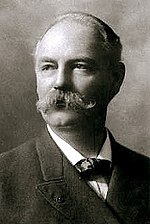Thornton Chase, Date of Birth, Place of Birth, Date of Death
TweetThornton Chase
American poet
 Date of Birth: 22-Feb-1847
Date of Birth: 22-Feb-1847
 Place of Birth: Springfield, Massachusetts, United States
Place of Birth: Springfield, Massachusetts, United States
Date of Death: 30-Sep-1912
Profession: writer, author
Nationality: United States
Zodiac Sign: Pisces 
About Thornton Chase
- Thornton Chase (February 22, 1847 – September 30, 1912) was a distinguished officer of the United States Colored Troops during the American Civil War, and the first western convert to the Bahá'í Faith. Chase was born in Springfield, Massachusetts to parents of English background and Baptist religion.
- After being schooled for college by Rev.
- Samuel Francis Smith he instead enrolled as an officer in the American Civil War serving with two regiments of United States Colored Troops, mostly in South Carolina, where he was wounded.
- For his service Chase was included on the Wall of Honor of the African-American Civil War Memorial completed in 1997.
- After the war he worked as a businessman, performed as a singer, and was published as a writer of prose and poetry while living in several states after leaving Massachusetts.
- He married twice and fathered three children. Long a seeker in religion, when he was nearly 50 he joined the Bahá'í Faith in 1894-5 –almost as soon as possible in America– and is commonly recognized as the first convert to the religion of the western world.
- After having organized concerts and businesses in his earlier days, he advanced the organization of communities of the religion especially in Chicago and Los Angeles, serving on early assemblies and publishing committees, the first national attempts at circulating news and guidance for the religion, and an elected national council.
- He also aided in the founding of other communities, gave talks for the religion in many places including Greenacre in Eliot, Maine, in the northeast and Seattle in the northwest, and authored early books on the religion including an account of his Bahá'í pilgrimage in 1907 and an introductory review of the religion in 1909.
- During his journeys to the West, ?Abdu'l-Bahá, then head of the religion, singled Chase out and identified his gravesite as a place of religious visitation.
- Ultimately Chase was named a Disciple of ?Abdu'l-Bahá.
- Collections of his papers began, posthumous articles by him were published, biographical articles about him appeared and his place in the history of the religion in America was contextualized.
- In 2002 a full biography on Chase was published by Robert H.
- Stockman and websites have had entries about him since.
Read more at Wikipedia
See Also
- Famous People's Birthdays on 22 February, United States
- Famous People's Birthdays in February, United States
- Famous writer's Birthdays on 22 February, United States
- Famous writer's Birthdays in February, United States
- Famous author's Birthdays on 22 February, United States
- Famous author's Birthdays in February, United States

